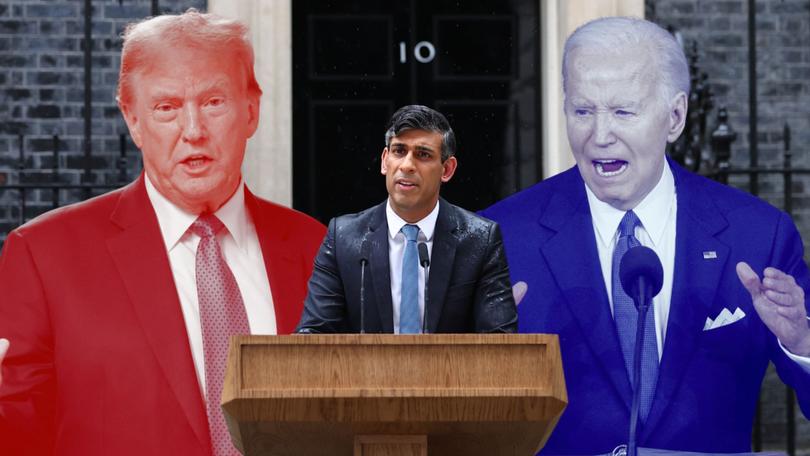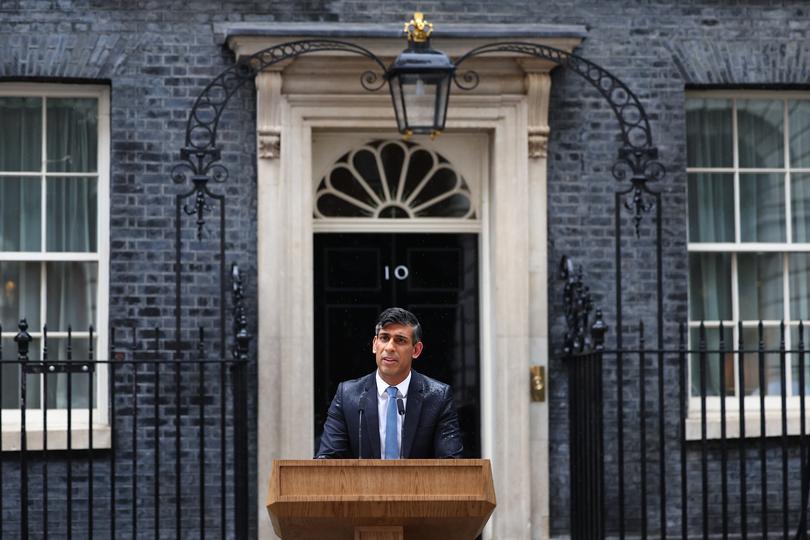EDITORIAL: Elections in the UK and US put the West at a critical juncture
EDITORIAL: The UK general election is likely to only be the curtain raiser to the main act — the showdown between Joe Biden and Donald Trump for the US presidency in November.

As far as starting guns go, Rishi Sunak’s surprise announcement of a UK general election on July 4 was a bit of a damp squib.
Sodden and seemingly forlorn, the Conservative leader made his pitch to voters outside 10 Downing Street amid a downpour, battling to be heard above the sound of Labour’s 1997 campaign anthem, Things Can Only Get Better, blasting from a protester’s boom box just outside the property’s gates.
Not the imagery he would have hoped for.
Sign up to The Nightly's newsletters.
Get the first look at the digital newspaper, curated daily stories and breaking headlines delivered to your inbox.
By continuing you agree to our Terms and Privacy Policy.Mr Sunak leaned heavily on defence and security in his soggy seven-minute speech, the only area in which his Conservatives lead Labour on public trust.
“This election will take place at a time when the world is more dangerous than it has been since the end of the Cold War,” he said.
“I will forever do everything in my power to provide you with the strongest possible protection.”

In all likelihood, July 4 will mark the end of 14 years of Tory rule in Britain. From an Australian perspective, a Keir Starmer Labour prime ministership will likely mean more of the same in the areas that matter to us most.
Sir Starmer has affirmed Labour’s commitment to the AUKUS pact, which would see Australia and the UK work together to design and develop nuclear-powered submarines to enter service in the nations’ navies in the late 2030s and early 2040s respectively.
In April, he said he intended to boost the UK’s defence budget to 2.5 per cent of the nation’s GDP.
“The changed Labour Party I lead knows that our nation’s defence must always come first. Labour’s commitment to our nuclear deterrent is total,” he said.
“In the face of rising global threats and growing Russian aggression, the UK’s nuclear deterrent is the bedrock of Labour’s plan to keep Britain safe. It will ensure vital protection for the UK and our NATO allies in the years ahead, as well as supporting thousands of high paying jobs across the UK.”
If change does come as expected in the UK election, it is likely to only be the curtain raiser to the main act — the showdown between Joe Biden and Donald Trump for the US presidency in November.
Mr Biden’s approval rating this month fell to its lowest level in two years, with Trump now leading the incumbent in five of seven swing states. Mr Trump has not given any public indication whether he will continue with AUKUS, though former prime minister Scott Morrison this month said the ex-president had given the pact a “warm reception” in a recent meeting between the pair.
With elections in more than 70 countries scheduled this year — involving more than 4 billion potential electors — 2024 was always going to be pivotal for democracy.
In the closing stanzas of the Cold War, an optimistic view took hold in the West that the world was approaching the “end of history”; that liberal democracy was the natural final form of government for all nations and its spread across the globe was inevitable.
That hasn’t turned out to be the case. Instead, we’ve seen the opposite, as autocrats tighten their grips on power and belief in democracy weakens. One can only hope that successful elections in the UK and US help claw back some ground.
